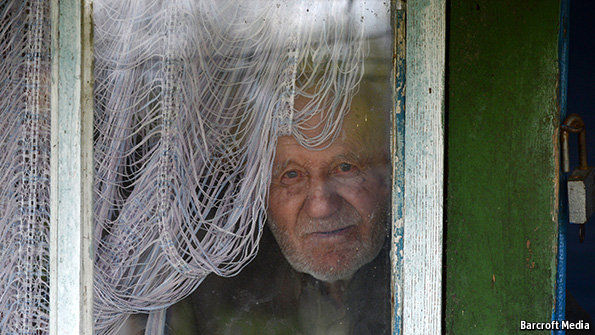
NON-FICTION, in the right hands, can prove to be more powerful and perplexing than novels. This is the case with Svetlana Alexievich, an author and investigative journalist who won last year’s Nobel prize in literature for her “polyphonic writings”. “Second-hand time”, her latest book to be translated into English, is her most ambitious yet. From the collapse of the Soviet Union in 1991, Ms Alexievich spent two decades writing down the stories of ordinary people in her native Belarus and beyond. Her book is a unique chronicle of that time and place, yet its themes of hope and loss are universal.
The stories pile up over 700 pages, with love, death and everyday concerns jostling for attention. In the cramped kitchens Ms Alexievich visits, the mundane and historic overlap. The voices she records—named and unnamed, literary Muscovites, Belarusian villagers, Party officials and mothers—repeat themselves, and each other. They argue about whether Stalin and Mikhail Gorbachev, the last leader of the Soviet Union, were villains or heroes. As their world crumbles, people seek solace in books, God, alcohol or suicide. Salami becomes one of the symbols of this brave new world; one man calls it the “benchmark of our existence”, suddenly abundant, though not necessarily affordable.
As in the author’s earlier books, war forms an omnipresent backdrop to their narratives. Older people recall the horror and glory of the second world war, the subject of her “War’s Unwomanly Face”. The present is warlike too; street vendors by the metro make one woman think of a “war film”. Reds clash with Whites, like after the October Revolution of 1917, and history seems to be repeating itself. “Were things any different in 1917? Some people were shooting while others were dancing at balls,” one woman wonders. This cyclical element gives the book its title, with one person observing that “the future is, once again, not where it ought to be. Our time comes to us second hand.”
Amid the new uncertainty, people cling to books and words. Lovers reading an underground copy of the memoirs of poet Osip Mandelstam’s widow forget to kiss, “that’s how ardently we believed that the word could change the world”. The language of the book is lyrical but simple, using words that are short, concrete and vivid. Bela Shayevich’s translation from the original Russian runs smoothly, despite the abundance of terms and cultural references that may be unfamiliar to international readers. Some passages read like music.
A professional listener, Ms Alexievich manages the feat of being present and invisible at the same time. If voices are her medium, so too is silence; when a teenager hangs himself in the bathroom, or when no-one says the final words at a funeral because “they didn’t know how”. Silences have been inserted in square brackets, like stage directions or punctuation. In one of her brief asides, Ms Alexievich announces that “I want to be a cold-blooded historian, not one who is holding a blazing torch.” Yet the result is always warm and human, however dark the content. Many of the people the author meets simply want to talk, sharing memories they had held on to for years or decades. With “Second-hand time”, Ms Alexievich has built a monument to these survivors of the collapse of the Soviet Union; a monument in words.